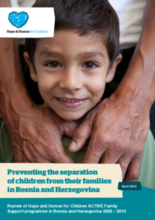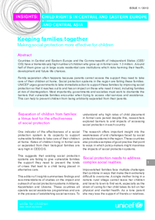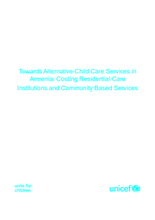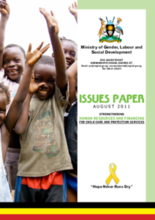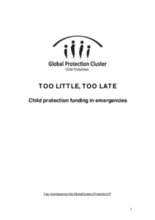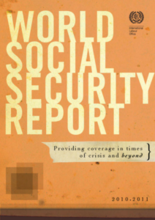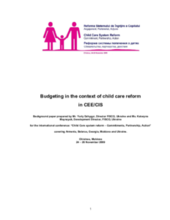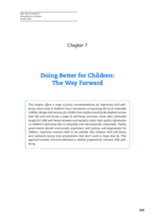Displaying 161 - 170 of 189
Hope and Homes for Children has been implementing ACTIVE Family Support in Sarajevo Canton in BiH since 2003. The program consists of two elements: the prevention of separation of children from their parents as the primary focus, and the reintegration of separated children from institutions back into their biological families. This unique and holistic program is tailored to the individual needs of each child and family and it is built on the following core values: partnership, respect, inclusion, sustainability and the best interest of the child.
This paper presents new estimates of the average lifetime cost per child maltreatment (CM) victim in the United States and aggregate lifetime costs for all new cases of CM incurred in 2008 using an incidence-based approach. The authors find that the lifetime economic burden of CM is approximately $124 billion. Given this substantial economic burden, the authors argue that the benefits of prevention will likely outweigh the costs for effective programs.
This edition of Insights produced by UNICEF summarizes the findings and recommendations of studies on the impact and outreach of social protection systems in Albania, Kazakhstan, and Ukraine where high rates of child placement in formal care still persist. The research offers important insight into the weaknesses and challenges faced by social protection systems in the region, but also point to ways in which policy-makers might maximise the impact of social protection systems in order to ‘keep families together’.
This recent study by UNICEF in Armenia costed different types of residential care and community based services.
This paper highlights human resource and funding gaps that constrain provision of child care and protection services. It advocates for strengthening of social welfare workforce and funding to improve child care and protection services in Uganda.
Report underscoring the need to examine protection in its entirety and ensure that all dimensions of the protection response are adequately supported
This folder contains guidance and planning and assessment tools to implement reform of national social care financing from institutionalized care to a family and community-based framework.
This report from the International Labor Organization is the first in a series of the World Social Security Reports whose chief aim is to present the results of regular statistical monitoring of the state and developments of social security in the world. It presents the knowledge available on coverage by social security in different parts of the world and identifies existing coverage gaps. It also examines the scale of countries’ investments in social security, measured by the size and structure of social security expenditure and the sources of its financing.
Summarizes main issues in public financial management which have prevented resource reallocation between residential and alternative care services for children.
This document is the seventh, and final, chapter of Doing Better for Children: The Way Forward, produced by the Organisation for Economic Co-operation and Development. The aim of this chapter is to contribute to the policy debate on child well-being, synthesising the previous chapters and drawing on the existing research and policy literature.

